India–Pakistan War | Global Stakes, Alliances & Escalation Explained
Discover how an India–Pakistan war could unfold: analyze global powers’ stances and alliances, and explore India’s strategic response to maintain regional stability.
5/9/20252 min read


India-Pakistan Tensions: A Region on the Edge, A World Watching
Tensions between India and Pakistan have once again reached a boiling point, with recent inhumane provocations and attacks by Pakistan-backed elements targeting Indian civilians and infrastructure. In a swift and firm response, India has launched precision strikes, showcasing both military capability and strategic restraint. As events unfold rapidly, questions arise: Could this escalate into full-scale war? If it does, who stands where in the global arena?
India’s Response: Firm, Focused, and Strategic
India has made it clear that it will not tolerate cross-border terrorism or civilian casualties. With surgical air and ground operations, the Indian Armed Forces are sending a clear message: provocation will be met with decisive power. The government has also ensured the international community is kept informed, underlining its right to self-defense under Article 51 of the UN Charter.
What If War Escalates?
If the conflict escalates into a larger military engagement, it will not remain a regional matter for long. Nuclear capabilities, international trade routes, and alliances will draw the attention—and possible intervention—of major world powers.
Global Powers: Who Will Support Whom?
United States
Likely Stance: Neutral, with diplomatic pressure on both nations.
While the U.S. has a long-standing strategic partnership with India, especially in defense, technology, and Indo-Pacific interests, it also considers Pakistan a counter-terrorism partner in some capacities.
In case of escalation, the U.S. is likely to call for restraint, support India diplomatically, and pressure Pakistan to act responsibly—but will avoid direct military involvement.
China
Likely Stance: Subtle support for Pakistan, strategic silence publicly.
China has economic and military ties with Pakistan, especially through the China-Pakistan Economic Corridor (CPEC). However, given its growing trade dependence on India and its own internal tensions (e.g., Taiwan, South China Sea), China will avoid open support for a war.
Likely action: Provide diplomatic cover to Pakistan at forums like the UN, but not commit militarily.
Russia
Likely Stance: Leaning toward India, neutral in official tone.
Russia and India share a deep-rooted defense and strategic partnership. Despite Russia's increasing ties with China and occasional outreach to Pakistan, Moscow is likely to back India diplomatically and continue defense cooperation.
Expect behind-the-scenes coordination with India, including military equipment support and possible intelligence sharing.
European Union
Likely Stance: Calls for de-escalation, aligns with India’s right to self-defense.
EU nations generally support India’s stance against terrorism but prefer peace in the region. The EU will not intervene militarily, but India can expect political support if it acts within international law.
Middle Eastern Nations (UAE, Saudi Arabia, etc.)
Likely Stance: Neutral publicly, warming ties with India privately.
While these nations have historic ties with Pakistan, India’s economic partnerships, energy needs, and diaspora presence have shifted the balance. Recent awards and diplomatic outreach to Indian leadership suggest a tilt toward India in the long term.
The Bigger Picture
If conflict escalates, global trade, oil prices, and regional stability will be at stake. The world cannot afford an Indo-Pak war, especially one with nuclear overtones. However, India has shown that it will not back down from defending its people, its borders, and its dignity.
Conclusion: A Nation Standing Tall
India does not seek war—but it will not shy away from giving a befitting reply to Pakistan’s inhumane actions. In a world where terrorism often hides behind diplomacy, India is stepping forward with clarity and courage. The global community must recognize this and ensure that peace is preserved, not at the cost of justice, but in support of it.
